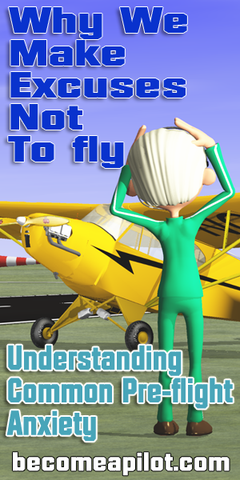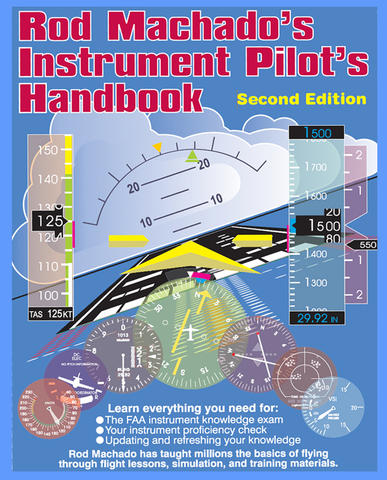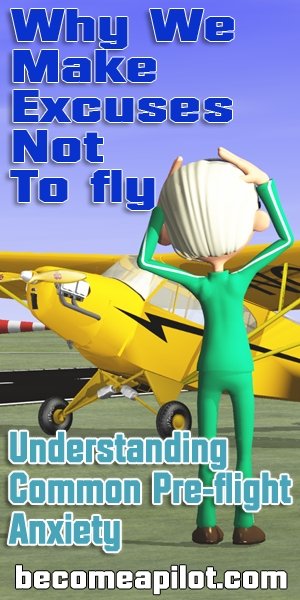 Name one thing that you'd spend thousands of dollars on, develop a relationship with, care a great deal for, then might fear being around. Any parent who said "teenagers" picked the second of two possible answers. The first answer is "airplanes." In an aviator's life there may come a time when they directly or indirectly seek reasons to avoid the cockpit; others are spared such experience.
Name one thing that you'd spend thousands of dollars on, develop a relationship with, care a great deal for, then might fear being around. Any parent who said "teenagers" picked the second of two possible answers. The first answer is "airplanes." In an aviator's life there may come a time when they directly or indirectly seek reasons to avoid the cockpit; others are spared such experience.
How peculiar this seems considering we spend most of our aviation adolescence conjuring reasons to be at the airport. But the same psychology that lures us to fly might compel us to quit. A time may come when we find ourselves, "Making excuses not to fly."
For someone to fly, pleasure must outweigh discomfort. It most often does, explaining why weekend skies are pasted with planes. For others, a growing anxiety subtly, yet insidiously, robs them of the delights flying once offered. This discomfort, cloaked in the form of self doubt, seemed harmless at first. But, in time, like a tooth gone bad, it became more and more difficult to ignore. Eventually, for some, it was easier to avoid the airport altogether than to have their stomach twisted in knots at the thought of flight.
What is this ugly thing in a pilot's mind that deprives them of flying's pleasures? Perhaps the answer lies with understanding the typical pilot having this experience. Several months ago I received a letter from a relatively young man (late 30's) who ran a cropdusting business. He confessed that with several thousand hours of flight time, a pocket full of instructor ratings, and a respectable number of years in the business, he was making excuses not to fly.
Surprisingly it wasn't the flying that created his anxiety. He, like many other pilots, feels quite at home in the cockpit's metal cocoon. Thinking about flying, however, produces discomfort. Once those wheels left the runway, the concern diminishes to a manageable level if not completely disappears.
This wasn't the only letter I'd received from pilots over the years expressing similar feelings. They all shared one thing in common: Their concern for safety raised doubts about their ability to fly safe.
It's ironic that the very thing motivating pilots to fly safe (concern about safety) is the one thing that may keep them from it. It's easy to say that these pilots decided to give up flying because of a frightening experience. This isn't necessarily true, however. Many aviators have scary experiences, but the overwhelming majority keep right on flying. They're resilient. They bounce back because flying's pleasures overshadow its discomforts.
I know one student who experienced one of the ultimate fears pilot's have—engine failure. On his third dual flight he pulled the carb heat to commence a descent. Coincidentally, at the instant full carb heat was applied, the engine suffered complete catastrophic failure. The engine frothed, snapped and cracked as it disgorged its metallic organs. With a fractured crankcase, pistons shot out and oil oozed onto the windshield like liquid from a wounded beast. Enough white smoke puffed out from behind the firewall to make the CFI wonder if this was the mother of all emergencies or, whether a new Pope had been elected. They landed safely on a golf course. After rolling to a stop on the 9th fairway, the instructor, known for his sense of humor, said to the student, "Don't pull the carb heat so hard next time." Scary? Yes. Nevertheless, the student is a commercial airline pilot today.
No, it's not always a frightening experience that keeps a pilot on the ground. It's frequently something far more intangible. Pilots making excuses not to fly, often hear about or personally witness the misfortunes of other aviators. In safety seminars, at accident scenes, or by descriptive testimonials, they develop an unusual empathy for the fallen aviator. They feel for and feel with their stricken comrade, whether they knew them or not. The event touches them in a deeper way and they lose their rational footing. More than once they've wondered, "If that had happen to me, could I have handled it?" This isn't a macabre pastime; it's more than that. They want answers, but these are seldom forthcoming.
For a few pilots these questions erode the very foundation of their confidence. Like the anaconda's grip, the unanswered questions are annoying at first, but efficiently suffocating with time. "That fallen aviator was a good stick, he shouldn't have died," ponder these concerned and empathetic pilots. While others, seemingly unaffected by the experience, shrug their shoulders, apparently quite satisfied with such vague epitomes and useless tokens as "pilot error."
These are aviators with a high degree of self reflection and introspection. Both qualities mobilize pilots to search for answers to the question, "How do I fly safely?" Unfortunately, these are also the qualities which may evoke self doubt when aviators ask themselves the question, "Why couldn't that accident victim fly safely?"
Herein lies what I believe to be the genesis of the problem. Over a relatively long period of time these safety conscious pilots, unable to reconcile an accident's "cause and effect" relationship, journey toward self doubt. And self doubt magnifies even the smallest of our fears. Even though these aviators don't say it, they wonder, "It happened to them; could it happen to me?" The question is no longer rhetorical. It sits like a devil on the shoulder, a constant reminder of our mortality.
 Now our mental machinery begins to project aviation as a "numbers" game without the benefit of self determination. For these empathetic and introspective individuals, flying's detractors appear more formidable than its attractors. Like a gambler holding bad cards, folding means survival. Airplane's are hangared, flight gear is stored, club membership’s lapse--they cease being pilots.
Now our mental machinery begins to project aviation as a "numbers" game without the benefit of self determination. For these empathetic and introspective individuals, flying's detractors appear more formidable than its attractors. Like a gambler holding bad cards, folding means survival. Airplane's are hangared, flight gear is stored, club membership’s lapse--they cease being pilots.
The irony is that it's usually the safest of aviators that give up their wings. These are the folks, in my estimation, that are least likely to have an accident, to be victim of circumstance, to be the prey of probability. Why? Because it's the slight fear produced by self doubt that keeps pilots respecting their limits.
Chuck Yeager, in his autobiography, said, "I was always afraid of dying. Always. It was my fear that made me learn everything I could about my airplane and my emergency equipment and kept me flying respectful of my machine and always alert in a cockpit." With the streets at Edward's air force base named after dozen's of Yeager's fallen comrades, he must have been constantly reminded of his own mortality. Certainly this must have produced self doubt leading to fear. But Yeager wasn't immobilized by his fear. It apparently galvanized his resolve to stave off death with knowledge.
The difference between Yeager and pilots who've ceased to fly is how they perceived fear. I have no doubt that Yeager must have perceived self doubt and fear as natural. It wasn't the ugly thing it appeared to be. After all, he credits fear with saving his life. It's part of the motivational drive that, in moderation, keeps all of us alive.
Other pilots must have perceived self doubt and its accompanying fear as something unnatural. To them it was something to move away from. They were immobilized by it. Self doubt, the product of over identification with aviation's accident victims, deprived them of flying's pleasures. When the distress of flight overshadowed its enjoyment, these pilots stopped flying altogether.
Returning to the cockpit means that we recognize self doubt and fear for what it is—part of the human condition. Going about the business of flight with a very small amount of fear and self doubt in the belly is not a sign to stop. If anything, it's an ally--something to help you survive.
But if fear and self doubt are immobilizing, strategies must be devised to manage them. If you have strong fear or strong self doubt, directly confront it. Like a wild animal, it must be wrestled to the ground and smacked between the eyes. Find someone knowledgeable about the most common fear producers: stalls, spins, engine failures. Ask them to teach you the truth about these things and shed the misconceptions, about what you fear.
Returning to the cockpit also means that we honestly interpret the perils of aviation. Aviation isn't dangerous. Don't you ever let anyone tell you it is. Feeding a pitbull rolled up bologna slices from your mouth is dangerous. Risky? Yes, there are elements of risk in aviation. Just like driving a car is risky, aviation is risky. But unlike an airplane, another automobile driver is more likely to involve you in an accident. Airplanes put you almost in complete control of the risk. Automobile drivers can't say the same.
Unfortunately, pilots will continue to crash because they will continue to make mistakes. But you must find solace in knowing that aviation is more self deterministic, more “under the pilot's control,” than other activities. It's not the numbers game some statisticians make it to be.
As I stated originally, for someone to fly, the joy must outweigh the discomfort. Balance the equation by putting the fun back into aviation. Do something fun with an airplane. Get another rating. Fly somewhere exciting. Fly a J-3 Cub. But, I caution you. Don't be surprised if you start having so much fun again—smiling, laughing, joking—that someone from the FAA becomes suspicious and wants you to take a drug test.
© Rod Machado 2015
